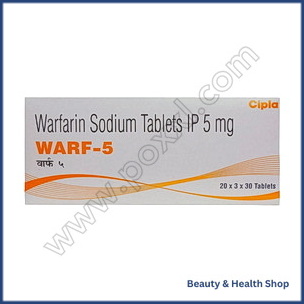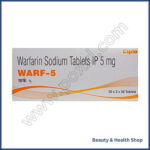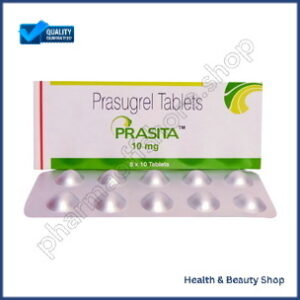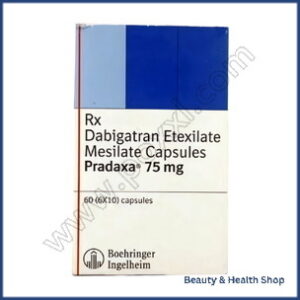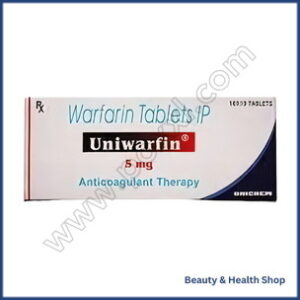ADDICTION
ALCOHOL DEPENDENCE
QUIT SMOKING
ALLERGY
ANTI FUNGAL
FUNGAL INFECTION
FUNGAL NAIL INFECTIONS
ANTI-REJECTION DRUGS
ANTI WORM
ANTIBIOTIC
BACTERIAL INFECTIONS
ARTHRITIS
GOUT
OSTEOARTHRITIS
RHEUMATOID ARTHRITIS
BLOOD
LOW PLATELET COUNT
THROMBOPHLEBITIS
VARICOSE VEINS
COLON
ANAL FISSURE
PILES
ULCERATIVE COLITIS
DIABETES CARE
DIABETES INSIPIDUS
DIABETES TYPE
DIABETIC FOOT ULCERS
GLUCOSE MONITOR
EYES/EAR CARE
DRY EYES
EYE CARE
EYE EXAMINATION
EYE INFECTION
EYE LASHES
EYE PAIN
GLAUCOMA
OCULAR HYPERTENSION
UVEITIS
FEVER CARE
MALARIA
RHEUMATIC FEVER
TYPHOID FEVER
GASTROINTESTINAL
ACIDITY
CONSTIPATION
CROHN'S DISEASE
DIARRHOEA
GALLBLADDER STONES
INTESTINAL ULCERS
IRRITABLE BOWEL SYNDROME
MOTION SICKNESS
NAUSEA
Warf (Warfarin)
Warf 3 mg (Warfarin)
Warf 2 mg (Warfarin)
Warf 5 mg (Warfarin)
| Active Ingredient (Generic Name): | Warfarin |
|---|---|
| Indication: | Prevention of blood clots |
| Manufacturer | Cipla Limited |
| Packaging: | 15 tablets in one strip, 10 tablets in one strip |
From: $40.00
Warfarin, an anticoagulant, hampers your body’s use of vitamin K and obstructs clot-forming proteins to thin your blood and prevent clotting effectively. This medication is vital in treating blood clots linked to conditions like atrial fibrillation, deep vein thrombosis, and managing clot risks in veins and arteries. Adhere strictly to prescribed dosages, take your daily dose consistently at the same time, and monitor your blood levels regularly. Warfarin also aids in managing various heart conditions, venous thrombosis, and is essential for individuals with mechanical heart valves. Be cautious of potential drug interactions, stick to a routine with doses, and seek advice before starting new medications for the best use. Be aware of serious side effect symptoms such as excessive bleeding and promptly consult medical professionals. Remember, to learn more about additional uses, precautions, and brand information, continue exploring the detailed factors of this medication.
To start understanding the use of warfarin, begin by grasping its mechanism of action. Warfarin is a medication known as an anticoagulant, which means it helps prevent the formation of blood clots. It works by interfering with the body’s ability to use vitamin K, an essential component in the clotting process. When you take warfarin, it blocks the activity of certain proteins in your blood that are necessary for clot formation. By doing this, warfarin helps to thin the blood and reduce the risk of clots forming in your veins or arteries.
Understanding how warfarin functions is important for using it effectively and safely. It is vital to follow your healthcare provider’s instructions carefully when taking warfarin to achieve the desired anticoagulant effect while minimizing potential risks. Regular monitoring of your blood levels is often necessary to make sure that the dosage is appropriate for your individual needs. By comprehending how warfarin works, you can better appreciate its role in managing conditions that require anticoagulation therapy.
Why is this medication prescribed?
Warfarin is prescribed to prevent and treat blood clots in conditions such as atrial fibrillation and deep vein thrombosis. Atrial fibrillation is an irregular heartbeat that can lead to the formation of blood clots in the heart, which can then travel to other parts of the body and cause serious complications like strokes. Deep vein thrombosis is the formation of blood clots in the veins, usually in the legs, which can break loose and travel to the lungs, causing a pulmonary embolism.
How should this medicine be used?
When using this medication, follow the dosage instructions provided by your healthcare provider. Warfarin is usually taken once a day, at the same time each day. It is essential to take this medication exactly as prescribed to achieve the best results. Warfarin is commonly taken by mouth with or without food. Make sure you swallow the tablet whole and do not crush, chew, or break it. If you forget to take a dose, take it as soon as you remember, unless it is almost time for the next dose. In that case, skip the missed dose and continue with your regular dosing schedule. Do not take a double dose to make up for a missed one. Regular blood tests are important to monitor your response to warfarin and adjust the dosage accordingly. Inform your healthcare provider about any other medications, supplements, or herbal products you are taking, as they may interact with warfarin.
Other uses for this medicine
Exploring additional applications for this medication can provide valuable insights into its versatility and potential benefits. Apart from its primary use as an anticoagulant to prevent blood clots, Warfarin has shown promise in treating certain types of heart conditions. Specifically, individuals with atrial fibrillation, a common heart rhythm disorder, may benefit from Warfarin to reduce the risk of stroke by preventing blood clots from forming in the heart.
Furthermore, Warfarin has been utilized in the management of venous thrombosis, a condition characterized by blood clot formation in the veins, particularly deep vein thrombosis (DVT) and pulmonary embolism. By inhibiting the clotting factors in the blood, Warfarin can help prevent the development and progression of these potentially life-threatening conditions.
Additionally, some individuals with mechanical heart valves may require Warfarin therapy to prevent clot formation on the prosthetic valves. This use of Warfarin is essential in maintaining the proper functioning of the heart valves and preventing complications associated with clot formation.
What special precautions should I follow?
When taking warfarin, it is important to check with your pharmacist before starting any new medication or supplement to avoid potential interactions. Keep a consistent routine with your warfarin doses, as changes in your diet or medication schedule may affect its effectiveness. Inform your healthcare provider about any changes in your health status or lifestyle habits to guarantee proper monitoring of your warfarin therapy.
Check With Your Pharmacist
Before starting warfarin, make sure to consult with your pharmacist regarding any special precautions you should follow.
- Regular INR Monitoring: Your pharmacist will guide you on how often you need to have your INR levels checked to guarantee warfarin is working effectively.
- Dietary Restrictions: Certain foods high in vitamin K can impact warfarin’s effectiveness. Your pharmacist can provide a list of foods to avoid or consume consistently.
- Drug Interactions: Inform your pharmacist about all medications, including over-the-counter drugs and supplements, to prevent harmful interactions with warfarin.
- Potential Side Effects: Your pharmacist can explain common side effects of warfarin and when to seek medical attention if you experience them.
What special dietary instructions should I follow?
To guarantee the effectiveness of warfarin, it is important to adhere to specific dietary instructions. Warfarin is a medication that helps prevent blood clots, but certain foods can interact with it, affecting its potency. It is vital to maintain a consistent intake of vitamin K-rich foods, as vitamin K plays a role in blood clotting. Be mindful of foods like leafy greens (e.g., spinach, kale), broccoli, and Brussels sprouts, as they can impact warfarin levels. Try to consume these foods in moderation to keep your vitamin K intake stable.
Additionally, alcohol consumption can affect how warfarin works in your body. Alcohol can increase your risk of bleeding while on warfarin, so it’s advisable to limit alcohol intake or avoid it altogether. Remember to communicate openly with your healthcare provider about your diet and alcohol consumption while taking warfarin to assure its effectiveness and minimize complications. By following these dietary instructions diligently, you can help optimize the benefits of warfarin therapy and reduce potential risks.
What should I do if I forget a dose?
In case you miss a dose of warfarin, promptly take it as soon as you remember. If it is close to the time for your next scheduled dose, skip the missed one and continue with your regular dosing schedule. Do not take a double dose to make up for the missed one, as this can increase the risk of bleeding. It is important to try to take your warfarin dose at the same time each day to maintain a consistent level of the medication in your body.
If you frequently forget to take your warfarin doses, consider setting a daily reminder on your phone or using a pill organizer to help you remember. Additionally, establishing a routine around taking your medication, such as associating it with a meal or bedtime, can also aid in remembering your doses.
If you have any concerns about missing a dose or if you have questions about your warfarin regimen, consult your healthcare provider for guidance.
What side effects can this medication cause?
Warfarin may cause side effects that require monitoring for persistent symptoms. Some of these side effects can be vital, so it’s essential to be aware of them. If you experience any concerning symptoms, such as unusual bleeding or severe headache, contact your doctor immediately.
Monitor for Persistent Symptoms
Persistent symptoms from this medication may include bruising easily, blood in urine or stool, or prolonged bleeding from cuts. It’s important to monitor your body for these signs while taking Warfarin. Remember to promptly report any concerning symptoms to your healthcare provider to guarantee your safety. Here are some common signs to watch out for:
- Unexplained bruising
- Red or dark brown urine
- Blood in stool
- Bleeding that doesn’t stop promptly
Keeping track of these symptoms can help catch any issues early and prevent complications. If you notice any of these persisting symptoms, seek medical advice promptly to address any potential concerns.
Some side effects can be serious. If you experience any of the following symptoms, call your doctor immediately:
If you encounter any of the following symptoms, make sure to contact your doctor immediately as some side effects of this medication can be serious. Warfarin, like any medication, can lead to adverse reactions that require prompt medical attention. Be aware of the following potential serious side effects:
- Unusual bruising or bleeding
- Severe headache or stomach pain
- Difficulty breathing or chest pain
- Sudden numbness or weakness in limbs
These symptoms may indicate a serious condition that requires immediate medical evaluation. It is vital to seek help promptly if you experience any of these side effects while taking warfarin to safeguard your health and safety.
What should I know about the storage and disposal of this medication?
When storing and disposing of this medication, remember to keep it out of reach of children and pets. Warfarin should be stored at room temperature away from moisture and heat. It is important to keep the medication in its original container or packaging to avoid any mix-ups. Make sure that the container is tightly closed when not in use to prevent exposure to air and moisture. Do not transfer warfarin to a different container unless instructed by your healthcare provider or pharmacist.
When it comes to disposing of warfarin, it is vital to do so safely and responsibly. Do not flush this medication down the toilet unless specifically instructed to do so. Instead, consult your pharmacist or local waste disposal company on the proper way to dispose of warfarin. They can provide guidance on the safest methods for discarding unused or expired medication to prevent any harm to the environment or others. Always follow their recommendations to ensure proper disposal of warfarin.
In case of an emergency/overdose
In case of an emergency or overdose involving warfarin, promptly seek medical assistance by contacting poison control or visiting the nearest emergency room. Warfarin is a potent anticoagulant medication used to prevent blood clots, but an overdose can lead to serious complications such as excessive bleeding. Symptoms of an overdose may include unusual bruising, blood in urine or stool, excessive bleeding from cuts, nosebleeds, or gums, and prolonged bleeding. If you suspect an overdose or experience any of these symptoms, do not delay seeking help.
When seeking medical assistance, be prepared to provide information about the amount of warfarin ingested, the time of ingestion, and any symptoms experienced. Medical professionals will assess the situation, provide necessary treatment to manage the overdose, and monitor your condition closely. Treatment may involve administration of vitamin K to reverse the anticoagulant effects of warfarin and control bleeding. It is vital to act swiftly in cases of warfarin overdose to prevent serious complications and guarantee the best possible outcome.
What other information should I know?
To get a comprehensive understanding of warfarin, familiarize yourself with potential drug interactions and dietary restrictions. Warfarin can interact with many medications, including over-the-counter drugs, herbal supplements, and prescription medications like antibiotics and antifungal drugs. Inform your healthcare provider about all the medications and supplements you are taking to prevent harmful interactions. Additionally, be cautious with your diet while on warfarin. Vitamin K can affect the way warfarin works, so it’s important to maintain a consistent intake of foods rich in vitamin K, like leafy greens. Avoid significant changes in your diet to guarantee a stable response to warfarin therapy.
Regular monitoring of your International Normalized Ratio (INR) levels is essential to determine the effectiveness of warfarin in preventing blood clots. Follow your healthcare provider’s instructions closely, including attending all scheduled appointments and blood tests. If you experience any unusual symptoms or side effects while taking warfarin, contact your healthcare provider immediately for guidance.
Brand names
Consider exploring popular brand names under which warfarin is commonly sold to gain insight into its availability and variations. Warfarin is marketed under various brand names by different pharmaceutical companies. Below is a table showing some of the common brand names for warfarin:
| Brand Name | Manufacturer | Strength |
|---|---|---|
| Coumadin | Bristol-Myers | 1mg, 2mg, 2.5mg, 3mg, 4mg, 5mg, 6mg, 7.5mg, 10mg |
| Jantoven | Upsher-Smith | 1mg, 2mg, 2.5mg, 3mg, 4mg, 5mg |
| Marevan | Aspen | 1mg, 3mg, 5mg |
These brand names may vary depending on your location and the manufacturer. It is essential to note that despite the different brand names, the active ingredient in all these medications remains warfarin. When discussing warfarin with your healthcare provider, make sure to mention the specific brand you are taking to guarantee accurate monitoring of your dosage and treatment plan.
Purchase Locations
When looking to purchase warfarin, you can find it at various pharmacies and online retailers. Warfarin is a commonly prescribed medication, and it is typically available at most local pharmacies with a prescription from your healthcare provider. Many chain pharmacies, independent pharmacies, and even some grocery store pharmacies carry warfarin in stock. If you prefer the convenience of online shopping, reputable online pharmacies and retailers also offer warfarin for purchase. When buying warfarin online, it is important to verify that you are purchasing from a legitimate and licensed pharmacy to guarantee the quality and authenticity of the medication. Some online retailers may offer discounts or convenient home delivery options, but it is essential to confirm their credentials before making a purchase. Whether you choose to buy warfarin from a physical pharmacy or an online retailer, always follow your healthcare provider’s instructions regarding dosage and usage to ensure safe and effective treatment.
To summarise
If you need to wrap up the information regarding purchasing warfarin, a brief summary can be helpful. Warfarin, commonly known by the brand name Coumadin, is a medication used as an anticoagulant to prevent blood clots. When purchasing warfarin, it is important to obtain a prescription from a healthcare provider, as it is a prescription-only medication due to its potential risks and interactions with other drugs. You can buy warfarin at various locations, including local pharmacies, hospitals, and online pharmacies. It is vital to confirm that you purchase warfarin from a reputable source to guarantee the quality and authenticity of the medication. Remember to follow the prescribed dosage and frequency recommended by your healthcare provider to maximize the effectiveness of warfarin while minimizing the risk of adverse effects. Always consult your healthcare provider if you have any questions or concerns about purchasing or taking warfarin to ensure your safety and well-being.


